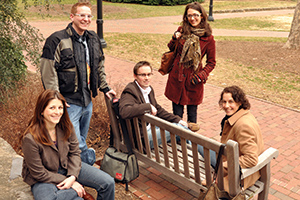From the Source
Head of the Class
An unmerited myth persists that university courses taught by graduate students are inferior to those taught by full professors. Though it is certainly true that professors with many years of classroom experience bring that wisdom and expertise to their teaching, graduate student instructors bring other qualities to the classroom such as accessibility, fresh perspective and enthusiasm, and are often quite dynamic and engaging teachers in their own right.
Undergraduates often relate well to graduate students, since they are students themselves and often not too far apart in age. Graduate students often can make complex material more accessible, as with science labs, and they can share with enthusiasm and confidence the newest, cutting edge knowledge resulting from their own dissertation research.
Professor Rachel Willis, chair of the 2011 University Teaching Awards Committee, and winner of numerous faculty teaching awards herself, believes that she did some of her best teaching as a graduate student. “I remember former Provost Dick Richardson, the best teacher I have ever seen both inside and outside the classroom, telling me that he felt his very best teaching was done when he was a graduate student. Years later, I must absolutely agree. While it is true that I have greater knowledge of both my subject matter and different teaching strategies to be successful now, I think that my youth and eagerness for teaching economics brought other important qualities to my teaching when I began my teaching career as a graduate student at Northwestern University.”

Left to right: Erika Bagley, Ted Gellar-Goad, Matthew Carlson, Natalie Fixmer-Oraiz and Elizabeth Greene
This year, five doctoral candidates were recognized for their exceptional teaching skills and were awarded Tanner Awards for Excellence in Undergraduate Teaching by Graduate Teaching Assistants. Notably, three of the five recipients are members of the Royster Society of Fellows, the University's distinguished interdisciplinary fellowship program. Graduate students from programs across the University are selected based upon their past achievements and future leadership potential. The 2011 Tanner award recipients, Erika Bagley (Psychology), Matthew Carlson (English), Natalie Fixmer-Oraiz (Communication Studies), Ted Gellar-Goad (Classics) and Elizabeth Greene (Classics), shared their thoughts and teaching philosophies with The Fountain's Rebecca Prettyman and Enelda Butler.
Fountain: Can you describe your experience in being both student and instructor?
Matthew Carlson (MC): Although I haven't taken any courses in a while, I feel near enough to that experience to relate to the student's perspective. It was not so long ago that I was discovering some of the authors and texts I'm now teaching, and I think—I hope—that my initial enthusiasm for the material still comes through.
Erika Bagley (EB): I feel connected with what it is like to be on the other side of the classroom in both directions. As an instructor, I have a sense of what my students need from me. As a student, I have a better sense of what my instructors want from me.
Natalie Fixmer-Oraiz (NFO): Grad student teaching has been a critical dimension of my professional development. It has afforded tremendous opportunities to develop a set of pedagogical philosophies and a teaching portfolio, providing concrete preparation for an academic career. It is definitely a juggling act, but I've found teaching to be a dynamic compliment to the process of research. I am particularly grateful for the levity and the spirit of curiosity that my undergrads continually inspire in my day-to-day work.
Fountain: Did anything surprise you about teaching—something that you did not expect?
Elizabeth Greene (EG): I was surprised at how much a class flows and comes together naturally when both teacher and students get excited about the topic. Student questions from one lecture would just flow naturally into the next. I felt successful guiding students in the right direction, and that they were naturally forming questions and conclusions on their own.
MC: Even though my main purpose for going to graduate school was to get the opportunity to teach literature at the college level, I was not prepared for how much I would enjoy it. I take pleasure in researching and writing, too, but nothing energizes me professionally quite like interacting with students.
Fountain: How do you keep students engaged?
Ted Gellar-Goad (TGG): The key to getting students interested in what you're teaching is to show your own passion for it. The particulars of Latin grammar can be drudgery, but my excitement can be contagious.
EB: I think there is a huge advantage in teaching psychology, especially child development, in terms of getting students engaged. Each student in my class has had the experience of growing up, so there is never a lack of personal stories that can be used to discuss a theory or concept. Students see relevance in what it is they are learning. It is my job to hang on to that natural motivation and bring meaning to experiences in a way that cultivates students' learning.
Fountain: How would you describe your teaching philosophies?
TGG: The subjects that we study may be remote from everyday life, but they can be made relevant and meaningful to all students. Students can excel if they are given explicit learning objectives, a clear path to accomplishing them and a reason why these objectives are worth their time.
NFO: Knowledge is power. I strive to cultivate a respectful, interactive and intellectually rigorous learning environment, to design courses that encourage critical thinking and reflexivity, and finally, to help my students locate themselves as powerful agents of change in their own lives and communities.
Fountain: What words of wisdom would you give to new instructors?
EG: Don't beat yourself up if you had a bad day, and don't feel like you have to know everything. Teaching is also an opportunity to learn new things, both about the subject you are teaching and about the needs of students. Don't be afraid to say, “That is a really interesting question for which I don't have a complete answer. Let's both look into that and discuss it further at the beginning of the next class.” Try things out and don't expect everything to work, but be willing to shift directions if necessary.
MC: I would encourage new instructors not to underestimate their students or dumb down the material. Undergraduates, especially at UNC-Chapel Hill, are eager and ready to learn, and they appreciate being held to reasonably high expectations. While I think it's important to shake things up and try out new and experimental teaching strategies, I've also learned that there's no substitute for organization and careful preparation.
Fountain: What have you discovered about yourself from your teaching experiences?
NFO: The classroom has encouraged me to balance preparedness and surrender. Though I prep extensively for each classroom encounter, I have a deep, cultivated respect for the questions and curiosities my students bring to the conversation. This sometimes leads us in rich, but unanticipated, directions. I strive to convey critical points in each lecture, but simultaneously invite my students to participate in the co-creation of a robust dialogue that reflects their own interests and concerns.
TGG: The Royster Society's interdisciplinary first-year seminar initiative provides a rare teaching opportunity. In collaboration with two other Royster fellows, I designed, from the ground up, a course title “Protest and Propaganda,” heavy on reading, discussion and critical analysis. The process of teaching the course itself taught me things I couldn't learn from teaching Latin or Greek. I also got to work with bright, engaged, first-semester students exploring challenging literary and sociological theories and applying them to real-world examples. From team-teaching I learned a great deal about best practices in running classes, especially discussion, and in evaluating students' written work.
When I entered graduate school, before I began teaching, I envisioned my ultimate career as focused on research and publication more than teaching. But I have found that teaching is, in and of itself, thoroughly fulfilling. A life centered on teaching is a life that I would thoroughly enjoy.
♦ Rebecca Prettyman and Enelda Butler


